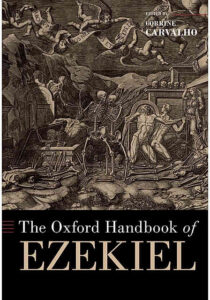CARVALHO, C. (ed.) The Oxford Handbook of Ezekiel. New York: Oxford University Press, 2023, 555 p. – ISBN 9780190490737.
O estado atual dos estudos sobre o livro de Ezequiel é robusto. Ezequiel, ao contrário da maioria das coleções proféticas pré-exílicas, contém indícios evidentes de que sua circulação primária foi como um texto literário e não como uma coleção de discursos orais. O autor era altamente educado, a teologia do livro é “sombria” e sua visão da humanidade é esmagadoramente negativa. Em The Oxford Handbook of Ezekiel, a editora Corrine Carvalho reúne estudiosos de diversas perspectivas interpretativas para explorar um dos livros mais debatidos da Bíblia.
contém indícios evidentes de que sua circulação primária foi como um texto literário e não como uma coleção de discursos orais. O autor era altamente educado, a teologia do livro é “sombria” e sua visão da humanidade é esmagadoramente negativa. Em The Oxford Handbook of Ezekiel, a editora Corrine Carvalho reúne estudiosos de diversas perspectivas interpretativas para explorar um dos livros mais debatidos da Bíblia.
Composto por vinte e sete ensaios, o livro fornece introduções às principais tendências nos estudos de Ezequiel, abrangendo sua história, estado atual e direções emergentes. Após uma visão geral introdutória dessas tendências, cada ensaio discute um elemento importante no envolvimento acadêmico com o livro. Vários ensaios discutem a história do texto (seu contexto histórico, camadas redacionais, crítica do texto e uso de outras tradições israelitas e do antigo Oriente Médio). Outros se concentram em temas-chave do livro (como templo, sacerdócio, direito e política), enquanto outros ainda analisam a história da recepção do livro e interpretações contextuais (incluindo arte, uso cristão, abordagens de gênero, abordagens pós-coloniais e teoria do trauma) . Tomados em conjunto, estes ensaios demonstram a vitalidade da pesquisa sobre Ezequiel no século XXI.
Corrine Carvalho é Professora de Teologia na Universidade St. Thomas, em St. Paul, MN, USA. Sua principal área de pesquisa é Ezequiel, Jeremias e Lamentações. No capítulo 1 deste livro ela diz: “Tenho trabalhado em Ezequiel há mais de trinta anos. Este é um campo que tem se beneficiado de um grupo muito dedicado de acadêmicos que se reúne regularmente e partilha discussões vibrantes, que tentei representar nos autores e temas deste livro”.
The current state of scholarship on the book of Ezekiel, one of the three Major Prophets, is robust. Ezekiel, unlike most pre-exilic prophetic collections, contains overt clues that its primary circulation was as a literary text and not a collection of oral speeches. The author was highly educated, the theology of the book is “dim,” and its view of humanity is overwhelmingly negative. In The Oxford Handbook of Ezekiel, editor Corrine Carvalho brings together scholars from a diverse range of interpretive perspectives to explore one of the Bible’s most debated books.
Consisting of twenty-seven essays, the Handbook provides introductions to the major trends in the scholarship of Ezekiel, covering its history, current state, and emerging directions. After an introductory overview of these trends, each essay discusses an important element in the scholarly engagement with the book. Several essays discuss the history of the text (its historical context, redactional layers, text criticism, and use of other Israelite and near eastern traditions). Others focus on key themes in the book (such as temple, priesthood, law, and politics), while still others look at the book’s reception history and contextual interpretations (including art, Christian use, gender approaches, postcolonial approaches, and trauma theory). Taken together, these essays demonstrate the vibrancy of Ezekiel research in the twenty-first century.
Corrine Carvalho is Professor of Theology at the University of St. Thomas in St. Paul, MN. Her research is primarily on exilic texts (Ezekiel, Jeremiah, and Lamentations) and she is currently working on a commentary on Ezekiel. She is an active member of both the Society of Biblical Literature and the Catholic Biblical Association, and currently serves as General Editor of The Catholic Biblical Quarterly.
Contents
1. Ezekiel Scholarship in the Twenty-first Century
Corrine Carvalho
2. Ezekiel in Its Historical Context
Marvin A. Sweeney
3. The Mesopotamian Context of Ezekiel
Daniel Bodi
4. Ezekiel and Israel’s Legal Traditions
Michael A. Lyons
5. Ezekiel among the Prophetic Tradition
Anja Klein
6. Ezekiel and Israelite Literary Traditions
Dexter E. Callender
7. Text-Critical Issues in Ezekiel
Timothy P. Mackie
8. Rhetorical Strategies in the Book of Ezekiel
Dale Launderville
9. Ezekiel as a Written Text: Archiving Visions, Remembering Futures
Ian D. Wilson
10. Ezekiel among the Exiles
Dalit Rom-Shiloni
11. Ezekiel and Politics
Madhavi Nevader
12. Priests, Levites, and the Nasi: New Roles in Ezekiel’s Future Temple
Tova Ganzel
13. Ezekiel’s Concept of Covenant
John Strong
14. Ezekiel and the Foreign Nations
C. L. Crouch
15. Ezekiel and the Priestly Traditions
Stephen L. Cook
16. Communications of the Book of Ezekiel: From the Iron Wall to the Voice in the Air
Soo J. Kim Sweeney
17. Ezekiel in Christian Interpretation: Gog, Magog, and Apocalyptic Politics
Andrew Mein
18. Pastoral Appropriations of Ezekiel
Steven Tuell
19. Ezekiel in the Jewish Tradition
Yedida Eisenstat
20. Where There’s Fire There’s Smoke: Text and Image in the Ezekiel Painting at Dura-Europos
Margaret S. Odell
21. Ezekiel and Gender
Amy Kalmanofsky
22. Embodiment in Ezekiel
Rhiannon Graybill
23. Ezekiel as Trauma Literature
Ruth Poser
24. Uncertainties in First Contact? Ezekiel’s Struggle Toward a “Comparative Gaze”
Daniel L. Smith-Christopher
25. Ezekiel’s Map of Future Past
Carla Sulzbach
26. Ezekiel Imperialized Geographies in the Nation Oracles
Steed Vernyl Davidson
27. Ezekiel’s Tangible Ethics: Physicality in the Moral Rhetoric of Ezekiel
Corrine Carvalho